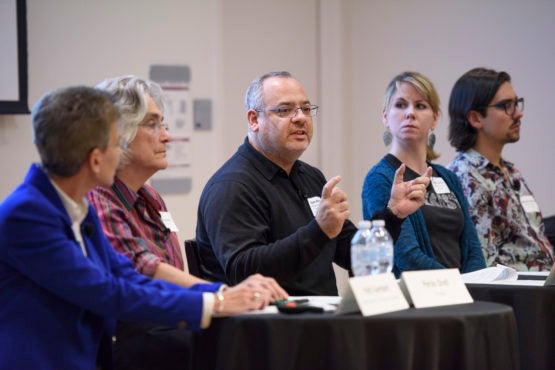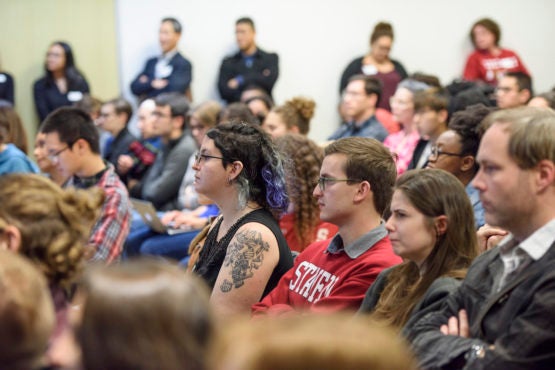Town hall discusses concerns about impact of tax proposals on graduate students
University and graduate student leaders shared information about current congressional tax reform proposals, their potential effects and efforts underway to combat them.
Graduate students and university leaders came together Thursday night at a town hall to discuss pending congressional tax reform proposals and their potential impacts on the Stanford community.
About 200 graduate students filled a meeting room at the Graduate Community Center for the session, co-hosted by the Graduate Student Council, the Stanford Solidarity Network, Provost Persis Drell and Vice Provost for Graduate Education Patti Gumport.

University leaders and representatives of graduate student organizations held a town hall Thursday night to discuss congressional tax proposals and their potential impacts on the Stanford community. Ryan Adesnik, center, speaks about the difference between the Senate and House bills. (Image credit: L.A. Cicero)
The focus: tax reform bills passed by the U.S. Senate and House of Representatives that would negatively impact higher education – and in particular, provisions of the House bill that would increase the federal tax bill for many graduate students. The two houses are working now to develop a single, final bill that would be voted on by both houses and if passed sent on to the president. The contents of that final bill are uncertain now.
“You are core to the mission of this university. You are very, very important to us,” Drell told the audience of graduate students. “The advocacy we have seen from you and your colleagues across the country has been having an impact.”
University leaders and representatives of student groups said they had taken positive initial steps working together to confront and respond to the tax proposals.
Graduate student groups have organized phone banks and letter-writing campaigns to tell lawmakers their personal stories about the negative impacts of the tax proposals. The university has mobilized trustees, alumni, business leaders and members of the campus community to contact lawmakers as well, and it is working on joint advocacy efforts with peer universities and national higher education associations.
“In challenging times, that’s when we need to come together to do collective sense-making and problem-solving,” Gumport said. “This is one of those times.”
“This is just the beginning of what we hope will be a collaborative and ongoing dialogue,” said graduate student Vivian Yan of the Stanford Solidarity Network.
Proposals in the two bills
The House tax bill – but not the Senate bill – would treat the tuition associated with graduate assistantships, as well as the benefits from employee tuition assistance programs, as taxable income. It also would repeal the student loan interest deduction.

Students and staff packed the town hall at the Graduate Community Center to discuss pending congressional tax reform proposals. (Image credit: L.A. Cicero)
Both the House and the Senate bills would levy a 1.4 percent tax on investment earnings of university endowments that are above certain thresholds – those with endowment assets of more than $250,000 per student in the House bill, or more than $500,000 per student in the Senate bill. At Stanford, the endowment provides critical financial support to teaching and research programs, including student financial aid and graduate education.
Speakers at the town hall said there are promising signs that advocacy efforts are having an impact on the tuition issue.
Most importantly, they noted, the tuition provision and repeal of the student loan interest deduction are in the House bill but not in the Senate bill. In addition, on Thursday, several groups of House Republicans began sending letters to leaders of the House and Senate, urging them not to include tax provisions adversely affecting graduate students in the final tax legislation.
“A tax on graduate tuition waivers would be unfair, would undermine our competitive position, and would inhibit the economic growth that tax reform promises,” said one letter authored by Rep. Pete Sessions, R-Texas, and co-signed by 30 House Republicans.
Student leaders at the town hall said they hope to spur continued and increased advocacy efforts in the coming days as House and Senate conferees work to craft a final tax bill.
“What I would like to see is a continued activation,” said Alejandro Schuler, a Graduate Student Council member representing the School of Medicine. “We need to keep that pressure up for the next seven to 10 days.”
Considering impacts
Graduate student leaders collected questions from students about the tax legislation in recent days and posed some of the most frequently asked questions to university leaders at the town hall. One common question was the likely financial impact on an individual student if the graduate tax provision was ultimately signed into law.
Gumport noted that the answer is difficult to gauge because Stanford has 9,400 graduate students, in 200 degree programs, pursuing 15 different kinds of degrees and holding a variety of combinations of fellowships and assistantships even during the course of one year – and some graduate students are self-funded. She said the university has roughly estimated the impact for some hypothetical student situations, though, and federal taxes could increase by several thousand dollars per year for students with research or teaching assistantships who take 8-10 units, if the graduate tax provision ultimately passed.
Another common question: What would the university do to respond in that situation? University leaders said it is difficult to speculate because small details in the final bill could have a big impact – as would the interpretation of the final law by the Internal Revenue Service as it created implementing regulations. Provost Drell said the impacts would be factored into the process of developing a 2018-19 university budget through the spring.
“We are still out on the field of battle, and that is where our focus is,” Drell said. “I can’t tell you what strategies we are going to take, because I don’t know yet what the problem is. A few words in a bill will change dramatically what the impact is. Once we know what we are dealing with, we will come up with mitigation strategies, and the strategy is going to be to minimize the damage to the mission and to the community. But I can’t know what I’m going to do until I know what the damage potential is.”
Presenters also noted that other provisions in the current tax reform bills could also be challenging for members of the Stanford community and others who live in high-cost areas of the country, such as provisions eliminating the deductibility of state and local income taxes and capping the deduction of property taxes.
A website created by student groups and the Office of the Vice Provost for Graduate Education provides updated information about the tax legislation and advocacy efforts.
